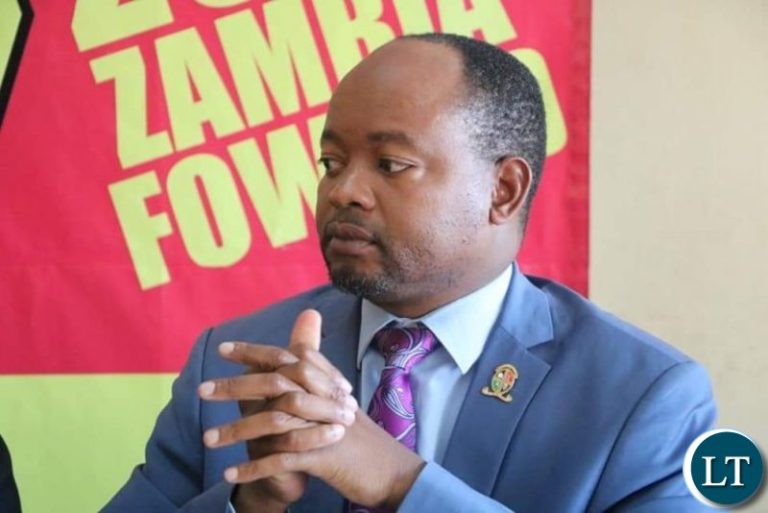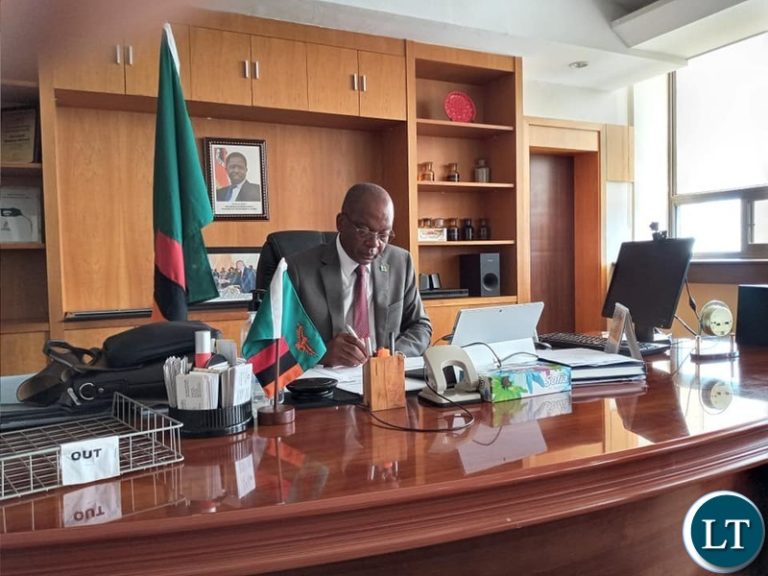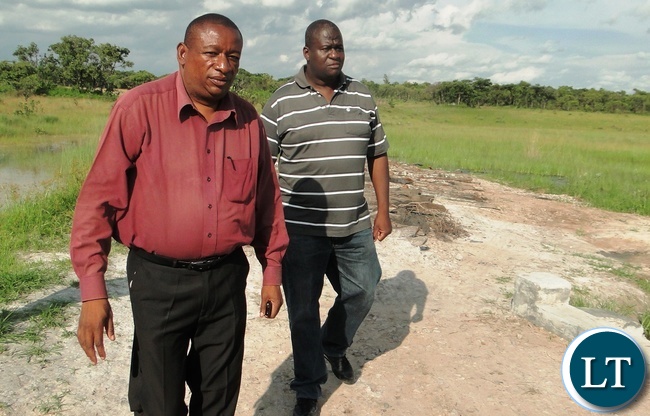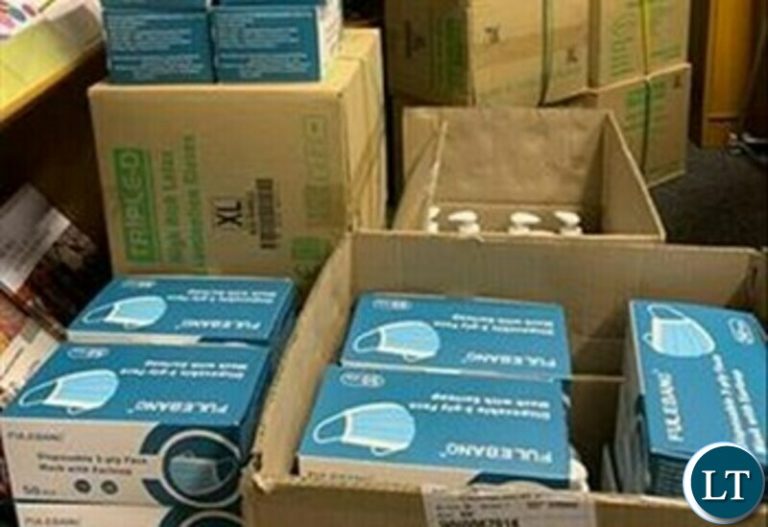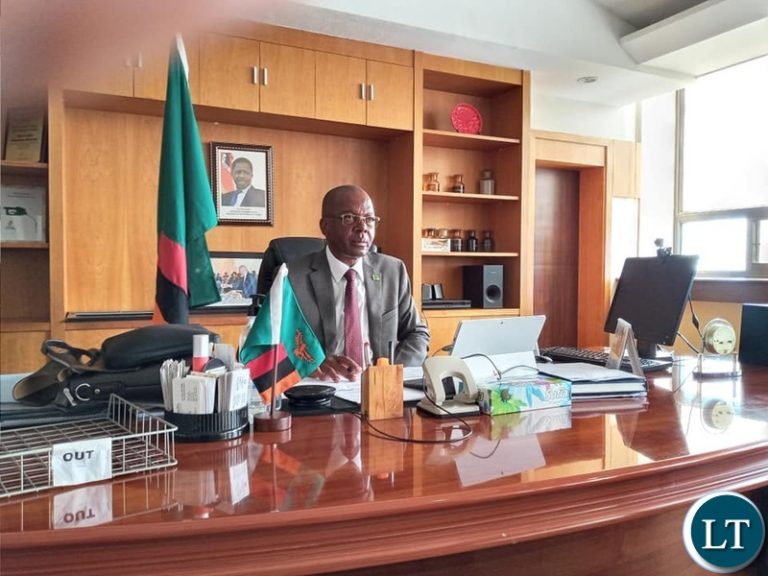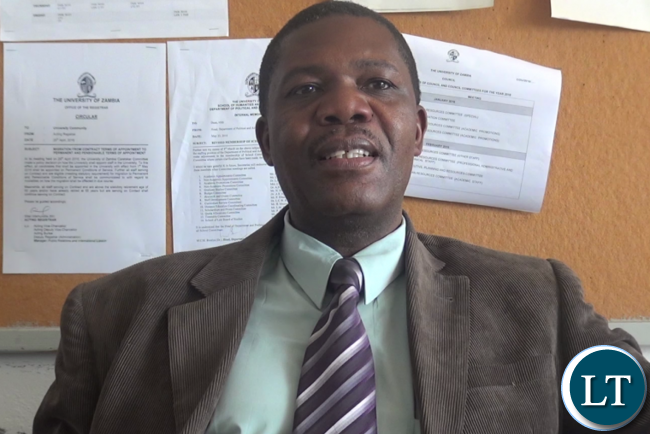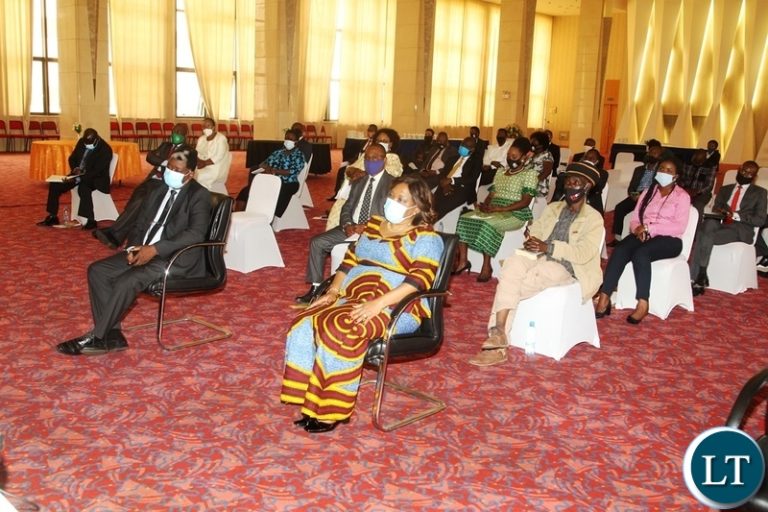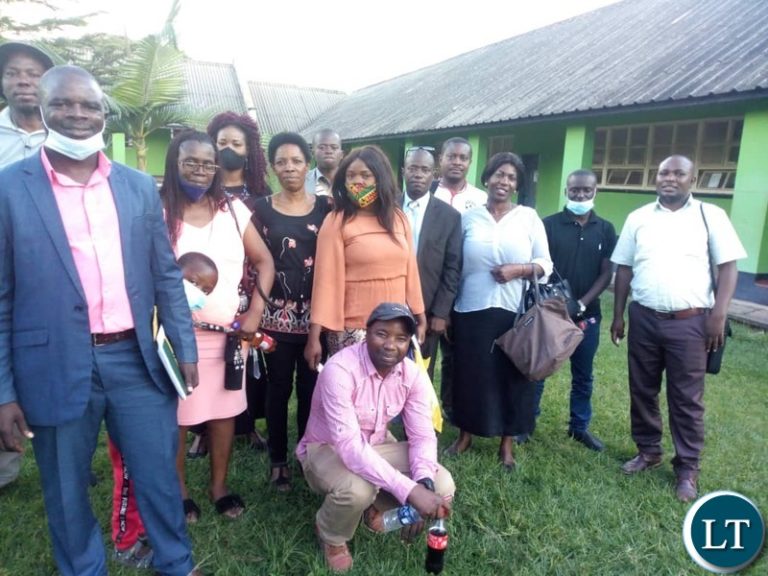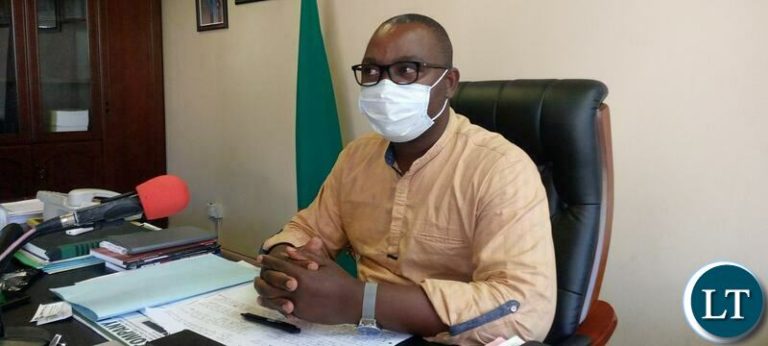THEME: CREATING ORDER AND NATIONAL VISION
THE NATIONAL PROBLEM:
The greatest aspiration of any people is to be better today than they were yesterday. A nation can endure great challenges today if there is a ray of hope for a better tomorrow. A family can fore go a meal or two today if they have hope that tomorrow will be better.
Hope is generated by a promise, but the execution of that promise is anchored on the morality and integrity of the one who made the promise. The August 12th 2021 election will be a pointless exercise if we, as a people don’t first identify the NATIONAL PROBLEM we currently face. I am sure you have heard the saying, “The definition of insanity is doing the same thing over and over again and expecting different results.
Zambia is at a critical juncture. The election ahead of us should be used to resolve the serious problems we face. The need of the hour is leadership of integrity and morality,one that is God-fearing and capable of using Godly wisdom to confront the national problems we face today and using our collective God-given intelligence and knowledge to address these problems and eliminate them.
To successfully do this, we need new leadership that has the right vision, the right team, and the right PLAN OF ACTION for the future of Zambia. The New Hope Movement for Multiparty democracy under my watch UNDERSTANDS the problem.
In 2011, the late Michael Sata and his Patriotic FRONT Party promised Zambians three things:
- More money in people’s pockets
- Lower taxes
- More jobs.
It is this promise that evoked hope in the Zambian people for a better future. They voted en mass in order to inherit that promise. Today, most Zambians are disillusioned about politics, politicians, and the future. All of us as politicians have been placed on the same list as liars and opportunists. Most Zambians have lost hope in the future because of the unfulfilled promises of 2011. Until Zambians learn to place premium on leadership, we shall always be short changed at the end of every election cycle, especially if we continue to vote for the “wind,” or the spirit of the moment. The most financed campaign may not be the most credible option for Zambia. It is said, “You shall know them by their fruit.”
The problem that has faced Zambia over time is the simplicity of the Zambian voter. The gullibility of our people. So often, it is the poverty and the illiteracy of most of our people that has led us into making dangerous and uninformed decisions. For the educated and enlightened, it’s our laziness and unwillingness to engage and stop the abuse of the
vulnerable poor that has perpetuated the suffering of our people. This cannot be allowed to continue. It creates, fuels and perpetuates a false reality, a false sense of euphoria only to wake up and realize nothing that was promised has been fulfilled or delivered. It is like having a bad dream and waking up and realizing that the bad dream is reality.
The consequences of this gullibility are the high commodity prices we are now faced with. Unaffordable mealie meal, fuel, electricity, rentals, school fees, medical costs and every thing that makes life bearable. The problem we face includes the issue of a divided nation on the basis of tribe and political affiliation. We are ready to injure and even kill those who don’t subscribe to our way of thinking. It is a principle of life that united we stand and divided we fall. How our great nation has fallen!
The New Hope MMD understands the problem. I understand the problem and that is why we are able to solve it. Under my leadership, we commit ourselves not to repeat the endless cycle of unfulfilled promises. As a people and as voters, we must interrogate the morality and sincerity of those who make meaningless promises that they have absolutely no intention of keeping. Since its creation, the Movement for Multiparty Democracy, popularly known as MMD, revolutionized the electoral process In Zambia ushering in a new dispensation and launching the birth of multiparty democracy in our nation that had been held captive to one party rule for decades. Zambians from all walks of life, political thought and persuasion, embraced and welcomed this new and fresh wind of change in our country. What seemed impossible was made possible. And history has
recorded for posterity that it was we, the MMD Party, that made this possible under the visionary leadership of our party’s founding fathers and mothers. Zambians can never forget how life in Zambia was transformed, how our economy grew and wasstrengthened and how our party and our nation was led by capable, visionary and bold leaders. The history of MMD speaks for itself, though not perfect, we provided a decentlife for many Zambians.
Sadly, through successive changes in our leadership, the winds of change ushered in by our party gradually died out leaving behind a paralysis in national growth anddevelopment like never before. There is a lack of vision, a lack of purpose and a total lack of dedication which our nation needs desperately from our leaders. I stand before you today to tell you that a new day is about to break forth in our beloved Zambia. I can say this confidently to you because we, the New Hope Movement for Multiparty Democracy, have a PLAN. It is a PLAN OF ACTION to help us get us out of this miry clay that is sinking us and get our feet back on solid ground. WE HAVE A PLAN to solve the national problems which have choked the hopes of many Zambians. We shall insist on a responsible and moral leadership with a proven track record.
THE BEGINNINGS: MY STORY
I would like to take a few minutes to share from my heart about my own humble journey that has led me to where today I serve as President of the New Hope MMD Party, Zambia’s most resilient opposition party in Zambia. It’s a journey that has many twists and turns but let me be the first to testify that through it all, I have felt and been led by the mighty Hand of our Lord. He has surely been faithful to me and to all of us.
I am a minister of the Gospel, a Pastor and have been one for 44 years. Today, I choose to introduce myself to my fellow countrymen and women. Not because Zambians don’t know me but because I have never taken the opportunity to introduce myself. For years the Media, Friends and Opponents have attempted to introduce me.
Today, I do so myself. I invite you come, journey with me. Many of you may not know much about this portion of my life journey.
My beginnings are as humble as many Zambians of my age group. I was born at Chitambo Mission Hospital, in a rural setting. The same place David Livingstone died almost 100 years earlier. He died on his knees with the well popularized prayer on hislips, “On these bended knees, May this nation become a Christian Nation……” On May 18th 1960 I was born in the same place. My mother almost died because of complications arising from my birth. In interceding for the life of his wife, my late father Sunday Peter Mumba asked God to save his wife’s life and promised that if his wife would live then this newly born child would Serve the Lord and his Nation. The Lord answered my father’s prayer. My mother lived and I would later offer my service to both God and Country.
Following David Livingstone’s prayer, it is not surprising that I have ended up with a lifelong dream of “Zambia Shall be Saved.” ZAMBIA SHALL BE SAVED. ZAMBIA SHALL BE SAVED.
In 1991, David Livingstone’s prayer and my dream were fulfilled when President Chiluba declared Zambia a Christian Nation.
Growing up in my home district of Chinsali connected me to the spirit of our nation’s greatest liberators.- Kenneth David Kaunda, Simon Mwansa Kapwepwe, Kapasa Makasa, Malama John Sokoni and other freedom fighters – who hailed from Chinsali. I was privileged to attend one of two of Zambia’s premier schools, Hillcrest Technical Secondary School in Livingstone. I graduated in 1978.
I was honored to serve as Regimental Sergeant Major in the Zambia Combined Cadet Force(ZCCF) while at Hillcrest, a duty that I discharged faithfully and to the extreme satisfaction of our Defense Command for Southern Province. My call to leadership was affirmed in many ways through my service at the ZCCF as I commanded the entire Southern Province and not my Secondary School only.
By God’s grace I have dedicated my life only to public service in line with the vow that my father had made to God. To serve God and Country. I have served as Pastor for 20 years, as a political leader for 24 years and as a diplomat for nearly three years. I remain eternally grateful to God for allowing me to serve in three critical sectors of society. Usually these are fields that are rarely crossed. Many people stay with one sector until death. I have served in Church, in Government and In Foreign Service as Ambassador. All this was God’s way of preparing me for this season.
As Pastor, I established a world wide ministry called Victory Ministries International which incorporated Evangelistic Crusades, Local Churches, Bible College, Television and Radio and shared international platforms with some of God’s finest servants, Reinhard Bonnke, Oral Roberts, Mensa Otabil, Myles Munroe and many others. We effectively flew the Zambian flag in all these international conferences around the world.In the process we contributed to the birth of the Charismatic Movement in Zambia. This movement continues to grow up to this day.
As Vice President of Zambia, I worked closely with the late President Levy Mwanawasa and grew Zambia’s economy to bring it amongst the 10 fastest growing economies in the world. We effectively and successfully zeroed the $7.2 billion dollar debt left by UNIP through stringent fiscal measures. This achievement by the MMD under late President Mwanawasa cannot be disputed nor denied. I am humbled to be part of this great success story.
As High Commissioner to Canada and Ambassador to Cuba and other island nations, I negotiated the largest mining investment of $7.8 billion (US Dollars) for Lumwana Mine by Barrick Gold of Canada. I was also elected President of the Ottawa Diplomatic Association, becoming the first African diplomat to ascend to that position since the inception of the Diplomatic Association. This was a great honor not only for me personally but for Zambia on the global stage, an honor that cannot be overlooked or dismissed.
I share all this with you to demonstrate the obvious trail of successes in all three sectors I have served in.
Today, I have a PLAN, A PLAN FOR ACTION, to bring my past experiences and this wealth and measure of success to the Presidency of Zambia.
CHURCH: ZAMBIA SHALL BE SAVED
At age 17, I dedicated my life to Christ. At age 19, I recognized a problem in the manner we were handling the most powerful message on earth, the Gospel. The message of the Gospel has brought hope and set free millions all over this world. At that time, the message was largely locked up within the four walls of the church, restricting its growth. I came up with a PLAN to grow the Pentecostal message. I formed an evangelistic team which went beyond the four walls of the Church. We went to the streets, night clubs, schools, stadiums and touched every province of Zambia, most of Africa and finally touched the global community where we proudly flew the Zambian flag.
As a young man of 22 years old, God gave me a vision for a saved and a transformed Zambia. I coined the vision statement, Zambia Shall be Saved. I have kept my focus on this vision for 44 years. In my crusades, I told Zambians that one day, Zambia shall be saved. I have never, and I shall never waiver from this vision: ZAMBIA SHALL BE SAVED – SPIRITUALLY, POLITICALLY, INTELLECTUALLY AND ECONOMICALLY.
On National television, I spread the vision, Zambia shall be saved. In my television and radio interviews, I cried out, Zambia shall be saved. The book that carries my story is called Zambia shall be saved. I have not only been consistent with this vision but I have carried the Zambian population along with this vision until now when it has become part of the nation’s DNA. Whichever province you visit, the mention of the statement, Zambia Shall Be Saved is immediately and unmistakeably associated with one name: Nevers Mumba. A generation later, Zambia is declared a Christian Nation with a day of National prayer, fasting and repentance as part of Zambia’s official calendar. Today, statistics have placed Zambia at 97.3% Christian. God has given us a new nation and we can all confidently say the Vision, ZAMBIA SHALL BE SAVED has now become a reality. It is now part of our DNA as a nation.
I stand here to make a further pledge, that in the same way we have witnessed a complete transformation of Zambia spiritually, under my leadership as President of Zambia, we shall experience the total transformation both politically and economically. And I would add intellectually as well as we need to revisit our educational system to ensure we are second to none in a world that is constantly and rapidly changing. We have a PLAN, A PLAN FOR ACTION, to make Zambia the greatest destination of all time.
THE NEW HOPE MMD
So why did we choose to call ourselves THE NEW HOPE MMD? This is a very important question to ask ourselves moving forward. Let us not forget that our God is a God of NEW BEGINNINGS. The Bible speaks to this very important concept and promise of new beginnings. New beginnings give humanity hope. It gives us as a people the confidence to rise up from defeat and try again.
In 1964, Zambians rallied around the HOPE of self governance. In 1991, Zambians rode on the HOPE of expanded personal freedoms of democracy. Today, Zambia is about to come alive by embracing a New Hope leadership of morality and integrity.
The MMD experienced her first loss at the national polls in September 2011. This was a significant development in the history of our party. The soul searching that followed that loss created a need to renew the organization and re align it with the aspirations, the hopes and dreams, of the Zambian people.
In 2012 the party held an extraordinary convention to choose a new President whose mandate would be to transform the organization and renew its opportunities for the future. I have no doubt in my heart as to why I was elected the 4th President of MMD with a landslide of almost 70%.
Our mandate was to change the direction, the character and renew the vision of the MMD. It is the execution of this mandate that riled some of our older colleagues who wanted to maintain the status quo. When they realized our determination, under my leadership, to change the organization, a concerted effort to dislodge us was exposed creating the basis for the instability within the party which followed and only ended on November 5th 2019 after the landmark judgement of Judge Sharon Newa where we were declared the legitimate leaders of the Party.
Those who plotted, cheated, lied, misled and thought they could destroy us as a viable party of national significance and relevance failed miserably in their efforts. Let me state for the record and may it serve as a reminder to everyone listening to me today, WE NEVER GAVE UP. WE NEVER SURRENDERED TO THEM, WE STOOD FIRM IN OUR RESOLVE TO SEEK JUSTICE AND WE WON. WE WON BECAUSE WE WERE DEDICATED AND COMMITTED TO THE PREMISE THAT THE NEW HOPE MMD WILL FOREVER BE DEVOTED TO THE RULE OF LAW IN OUR NATION. IT IS THE FOUNDATION UPON WHICH OUR PARTY WAS BIRTHED. IT IS A FOUNDATION THAT CANNOT BE SHAKEN OR DESTROYED. IT WITHSTOOD THE ASSAULT BY INTERNAL AND EXTERNAL OPPONENTS ON MY LEADERSHIP AND ABILITY TO LEAD OUR PARTY. WE PREVAILED. WE WON. THEY WERE DEFEATED.
The instability we experienced injured the image of the party and made many Zambians to look away. Today, we gather in this special place to demonstrate to all Zambians that your party is back. We are back as a united front to restore Zambia’s place among the community of progressive Nations. We shall leave this place as a united party with great hope and rededication to unite our divided nation.
To distinguish ourselves from the old MMD which lost power in 2011, we shall leave this place as NEW HOPE MOVEMENT FOR MULTIPARTY DEMOCRACY. Projecting a new beginning, not only for our party but for our nation as well.
Many Zambians had turned their backs on us because of the infighting and we were not counted among parties that were expected to perform well in this year’s election. To day, we stand UNITED and invite all Zambians to make MMD the party of choice this August.
MMD did not just re introduce multiparty democracy but also improved the economy to new and impressive levels. The MMD policies and strategies reflected a new, bold way of thinking that changed the trajectory of our nation. Under my leadership, the New Hope MMD is a renewed party, alive and well, and well positioned to correct the errors of a tired administration with no energy to return Zambia to the path of growth and prosperity.
To the Christian community, it is significant to recognize that it was the MMD under President Fredrick Chiluba which declared Zambia a Christian nation.
Our Christian faith teaches us that as precious as it is to receive forgiveness, it is equally important and vital to seek and ask for forgiveness of those we have wronged.
As such, I wish to make a statement that I offer sincerely and from the bottom of my heart. As the new President of the Party, a public apology to our founding father Dr Kenneth David Kaunda and his family for the unfair imprisonment over allegations which could not be justified by our own justice system when MMD was in office. As a Christian leader, I realize the importance of cleaning up the past in order for God to show us favor in the future both as a party and as a nation. Whether we like it or not, KK is the founding father of our beloved Zambia and we need to ensure that his legacy is respected, honored and protected in our nation We, the New Hope MMD, have a PLAN to heal the wounds of the past and place Zambia on a new path brotherhood.
ORDER:
The first act of God before he created the universe was to create order. The earth had no shape and there was no order. Before he could create man and the rest of creation he spoke order into existence. Let there be light.
Zambia’s biggest crisis is the lack of order and systems upon which you can anchor development and sustainability. The New Hope Movement for Multiparty Democracy has a PLAN, A PLAN FOR ACTION for the recovery of our nation by replacing the deliberate confusion and disorder that currently exists with order and systems.
Zambia does not only tolerate disorder but also protects it. When disorder exists, corruption and poverty reigns. In disorder, criminals and the corrupt become millionaires, they ascend to political power and deal a mortal blow to equitable development. Unfortunately, disorder eliminates the hardworking and upright citizens. Disorder creates anarchy and spreads diseases like cholera, malaria and the like. Many educated Zambians leave the country for developed nations in search of ORDER, not necessarily wealth. We have more wealth here than all Europe put together, but sisorder has robbed us of our rightful place in the global community. The New Hope MMD has a PLAN, A PLAN FOR ACTION, to bring order to the nation.
There shall be order on the streets. In offices. In markets. In transactions and in the manner government agencies run the affairs of state. There shall be heavy penalties for those whose survival and criminality feeds off confusion and disorder. We shall recreate the social image of our nation. We shall make it destination number one for both investment and tourism. New Hope MMD in government has a PLAN to restore dignity and prosperity for our nation undergirded by systems that really work and serve the interest of all Zambians.
VISION
It is a well-established fact that regardless of how talented the players on the pitch are, if there is no goal to aim for, no one can score. Zambia has over the years adopted world class programs and yet the economy remains undeveloped. Zambia has a lot of skilled activity but leadership has not clearly outlined the vision.
It is said, “Where there is no vision, people perish.” This is an immovable truth. If you can’t see, you can’t move forward. If a nation has no vision, the citizens perish. The nation cannot move forward if we are constantly looking in the rear view mirror.
The New Hope MMD has a PLAN. It’s a PLAN FOR ACTION that casts a clear vision for all Zambians. A vision that shall guide us to the New Zambia we all aspire for. A Zambia where everyone is treated equal. A Zambia where tribe or political affiliation do not interfere with one’s journey to prosperity. A Zambia that sponsors innovation of our youth. A Zambia that determines its own destiny where women play an integral part. A Zambia that competes equitably on any international platform. A Zambia that has and understands the national dream.
On being elected into office this August, I will commit to the notion that Zambia shall have a common dream shared by all Zambians. It is this dream that shall unite us and give us the patriotism to rebuild our nation. The New Hope MMD has a PLAN to unite the country. The New Hope MMD shall form an inclusive government that pulls in the best brains and hearts that Zambia has. We shall include Zambia’s best from other political parties and from civil society.
THE ECONOMY:
A strong, healthy, and vibrant economy is the backbone of any nation. The New Hope MMD under my watch shall rebuild the economy to higher levels than those we left in 2011.
Zambian families understand the complexity of running a home in an economy which only takes and never gives back in the same measure. Zambians understand how painful it is to try to put food on the table for the whole month.
The national economy is a mirror of the household economy. In 2011, we left a bag of mealie meal at K35.00 per 25kg. We left the Kwacha exchange rate at K3.50 to a US dollar. We left Zambia priding herself as one of the world’s ten fastest growing economies. We left the foreign debt stock at the lowest level since independence and foreign reserves at about $3 billion. The economy was growing at an exceptional rate. To have created such a resilient economy, we ensured high levels of fiscal discipline.
The New Hope MMD has a PLAN to restore the economy by employing proven economic policies that shall create real wealth.
Most African nations have adopted a colonial approach to economic growth. They write a long WISH list of what they want. They then look at their gross income which is always less that the WISH list. They take the wish list called the budget to parliament and get it approved. Following the approval they leave for Washington and Paris with a begging bowl for the deficit in the wish list. Once well wishers come to our aid with loans we start to run our countries on artificial wealth which does not reflect our true economic power.
The New Hope MMD has a PLAN to propose the opposite. We shall look at our national income and then write our wish list which does not cost us more than we can generate.
We shall feel the pain for a while, but we shall adjust and reclaim our dignity.
THE DEBT:
The World Bank has revealed that our National Debt now stands at $27 billion dollars. The government claims our debt stands at $15 billion. Regardless of who is right, our debt stock remains the greatest hindrance to economic recovery. Until the debt is repaid, Zambia shall remain enslaved and vulnerable. We qualify to deal with the debt crisis because serving under the late Levy Mwanawasa, we were confronted with a similar challenge of debt. With a systematic strategy and fiscal discipline, Zambia for the first time enjoyed a debt free status. The MMD achieved it. The first step to getting out of the sad, unfortunate state we find ourselves in is to acknowledge that we have messed up and are in trouble as a nation. We must not be evasive. We must take responsibility.
The second step is to seal all loopholes that have created this crisis.
a) Unrestrained public expenditure
b) Unrestrained borrowing
c) Unrestrained Corruption
The third is to redeem Zambia’s Name and Reputation by creating a sustainable framework which exudes confidence on the part of multilateral partners. We must show highest levels of fiscal discipline. The New Hope MMD shall agree on a repayment plan which shall restore confidence in our new levels of accountability. NEW HOPE MMD has a PLAN and promises to change the economic structure of our nation. We shall live within our income.
OUR FOREIGN POLICY:
Under the New Hope MMD administration, we have a PLAN that ensures that we shall not be an appendage of any foreign power. We shall never ever be colonized again, either politically or economically. We shall live within our means so that our existence is not completely dependent on other economies. We shall be free to make our own political decisions. We shall choose our own friends and we shall demand for respect in all our multilateral transactions. We shall ensure that Zambians have the first share in all the resources of the country. We shall ensure that Zambians are the bosses within the boundaries of our nation. We shall strengthen all productive and mutually respectable bilateral relations.
We shall also further cement the Zambia- Israel relations by moving our embassy to Jerusalem, the eternal capital of Israel. Zambia has a rich history with Israel and we intend to strengthen this relationship.
A CALL TO THE CHURCH:
I am convinced that the season for the Church to provide national leadership is now. We have been prepared for a generation and we cannot be called unqualified. In this generation we have upped the Christian influence to 97% of the population. We have declared Zambia a Christian Nation and we have adopted Christian principles and values as the guiding light into our future. What is left to complete this progress is to elect practicing Christians at all levels of governance. August this year gives us an opportunity to complete the Godly project of making Zambia a truly Christian Nation and a light house on the continent of Africa.
CONCLUSION: A WASTED VOTE
We have heard some people say, voting for MMD shall be a wasted vote because of the intra party challenges we faced for three years. I wish to define what a wasted vote is. A wasted vote is one which you cast under a spell. The one you cast under outside influence. The one you cast on a so-called popular candidate whose core values you don’t believe in or agree with.
The vote is sacred. It is supposed to represent your innermost convictions and values. The vote is usually wasted and compromised by tribe or political party affiliation.
On 12th August this year, the vote for the New Hope MMD is a vote for Godly values and justice for all Zambians.
We are convinced that this year’s electoral victory depends on how committed believers in Christ shall cast their vote. Committed Christians should resist the temptation to vote along party or tribal lines. They should choose righteousness above their tribe.
The question on your mind might be, but is MMD popular enough to be elected? Maybe the question for the believer should be, Is morality and integrity in a Christian nation necessary? I believe it is because we need it. There will always be those who are satisfied with the status quo. They were satisfied under colonial rule. They were satisfied under one party rule. They are now satisfied with the status quo. The New Hope MMD has a PLAN, A PLAN FOR ACTION, to offer continuity of all democratic freedoms, a healthy economy, a new Christian leadership and a proven track record. There is a shift towards God in the nation. There is a hunger for equitable justice.
Zambians have sensed this change and have shifted. New Hope MMD is here for such a time as this to provide our nation with the new leadership needed to move our nation forward.
As I conclude my remarks, let me leave you with this thought: my life has been a life of upsets in the social order.
In 2003, I was not a member of MMD and therefore was never considered in line for the Vice Presidency of Zambia, but against all odds, the lot fell on me.
In 2012, when I contested the Presidency of MMD, I was three months behind the two front runners who had started their campaigns three months earlier while I was still serving as High Commissioner in Canada. I was told not to waste my time as I was not the preferred candidate. When the votes were counted there was a huge electoral upset. I emerged with a landslide of 70% of the vote.
We face this year’s election with similar confidence that, “…the race is not to the swift nor the battle to the strong but chance and opportunity can come to any one.”
I am convinced that the hour has come for the baton of leadership to be placed in the hands of the New Hope MMD. The time for change has come. If Zambians don’t seize this opportunity to usher in a new dispensation of hope through change, we will have no one else to blame but ourselves. There is an old saying: IF ITS GOING TO BE, ITS UP TO ME. I therefore charge all MMD members nationwide to go into all Zambia and announce that victory is coming. The winds of change are blowing all across Zambia. We are in the season of the latter rain. I am here to tell you that the New Hope MMD Party is alive and well. We have weathered the storms of adversity and assaults and survived.
WE ARE STRONGER TODAY THAN WE HAVE EVER BEEN BEFORE.
We are in the dispensation of new beginnings. In the United States, former Vice President Joe Biden of a former ruling party has become President of the United States. History was made with the election of America’s first woman Vice President, something many pundits had deemed impossible. Last year in June, in our neighboring country of Malawi, a pastor Rev Lazarous Chakwera, running on a former ruling party was sworn in as President of Malawi. What many pundits had deemed impossible happened! It is therefore not beyond Zambia’s reach for a former Vice President and a Pastor, Nevers Mumba, running on a former ruling party, the MMD to be sworn in as the 7th President of the Republic of Zambia.
But I say again, if its going to be, its up to each and every one of us to carry our Plan, A Plan for Action, to every corner of Zambia. We cannot rest, we cannot sleep, we cannot assume anything until victory is in our hands on August 12, 2021.We must work tirelessly while it is still daylight. We cannot and must not give up. Never give up, even when all odds seem to be against you.
I call on all Zambia to witness and be part of the greatest electoral upset in the history of our nation. Against all odds, Victory is certain. Together we can usher in a new era of hope, prosperity, strength and unity under the able and capable of leadership of a tried and true and tested party, the New Hope MMD Party.
May God bless our great Republic.
Zambia Shall be Saved.
I thank you.


